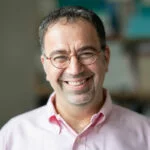On December 10, 2024, Daron Acemoglu delivered an acceptance speech at the Nobel Banquet in Stockholm, on behalf of himself, Simon Johnson, and James A. Robinson. Read his remarks below or watch the recording.
“Your Majesties, Your Royal Highnesses, Excellencies, Dear laureates, Ladies and gentlemen,
On behalf of Professor Johnson, Professor Robinson, and myself, I wish to thank the Royal Swedish Academy of Sciences and the Nobel Foundation for recognizing our work on the origins of economic and political institutions and the ways in which they shape global inequality. We are heartened by this recognition not just because of the great honor it confers on our work, but also because of the encouragement it provides to many young scholars working on these topics. This has been a collective effort by many people, including some in this room, demonstrating how combining economics and history can shed light on the big questions of social science.
Our research showed that inclusive institutions – such as democratic participation, the rule of law, secure property rights, and broad access to economic opportunities – are a major contributor to shared prosperity in all parts of the world.
Today, 25 years later, the same institutions are in danger. Democracy is threatened almost everywhere, and support for democratic institutions is at a modern low. And now the world must confront the problems brought by a warming climate, new global power relations, and rapidly aging populations. Perhaps most importantly, AI promises to disrupt everything, everywhere, all at once.
History again has lessons for us. Shared prosperity has only occurred during some periods of human history, and it has never been an automatic process. Inclusivity is key. If, in the name of progress, the politically powerful trample on people’s rights and voices, if the privileged start to see the rest of society as expendable, if the elite mistakenly convince themselves that only their ideas and talent matter, this will shatter the institutions that underpin shared prosperity. Institutions are always about choices.
What worries us also gives us hope. We can build better institutions and choose a direction for technology that creates more good jobs. But this has to be a collective effort, too – by all of us in this room and beyond, including young researchers as they venture into new areas to ask the big questions about institutions, technology, inequality, and how we can secure shared prosperity in the age of AI.”
